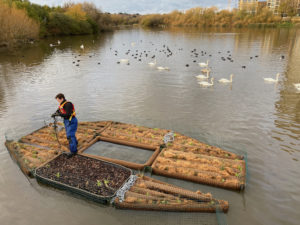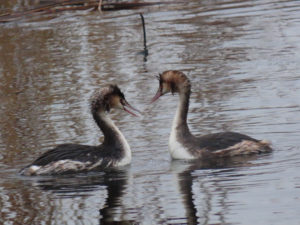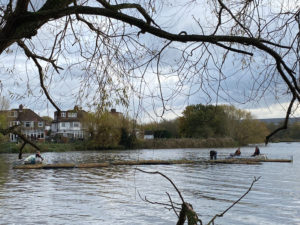November brings new floating ecosystems to Brent Reservoir (Welsh Harp), as weeks of rain blur the boundary between water and land, writes Ben Watt.

November. The reservoir is full after weeks of rain. The boundary between water and land is less defined. Reed bed fringes are squelchy underfoot. A cracked storm drain floods the east marsh path. Woodlands seem danker, mosses greener. I’m reminded Brent Reservoir (Welsh Harp) is just a shallow flooded natural valley in the heart of London.
Common snipe are returning. I count eleven one lunchtime. Someone says there are siskins in the alders near the southern shore. And a northern pintail drops in at the end of the month.
The big news is the arrival of the nesting islands for the locally threatened great crested grebe. In the early nineties, following the Welsh Harp’s last major wetland restoration project, up to fifty pairs would breed at the reservoir, but numbers are most likely down in single figures these days. The reasons for the fall-off are not fully clear but it probably doesn’t help that the great crested grebe is a notoriously useless nest-builder. They’ll throw down a shambolic handful of twigs on some floating waterweed, and act surprised when it all washes away the next time it rains heavily. Which of course it is doing with increasing unpredictability these days.

The funding for the new islands — or ‘floating ecosystems’ — was sourced last year by reservoir owner Canal and River Trust after we pushed for habitat improvements. They arrive in sections in pouring rain mid-month, and are assembled and planted up in more pouring rain over three days at the sailing club. On installation day, the sky finally clears and a dinghy tows them down to the marshes. CRT’s ‘comms’ officer is aboard filming the auspicious event on his iPhone.
I watch from the shore. Some sections are left temporarily moored to the pedestrian bridge, where birds are so heavily over-fed by well-meaning locals that an opportunistic rat population has established itself. By the time the first nesting island is in place, it is already home to a naan bread.
And it all proves to be a popular social media story. Upbeat, relatable. A simple campaign victory. Achievable goals. Natural England’s Tony Juniper and the Green Party’s Siân Berry tweet their approval. It is a good day for all.
At the end of the month I meet the now Labour-led Barnet Council’s new biodiversity and conservation officer. Our Cool Oak team counts this as another campaign victory, having called vociferously for it from day one back in spring 2021. Recent Tory administrations at the council have showed scant — some would say zero — interest in biodiversity. There has been little eco-investment since the nineties. Green spending has ended up meaning playgrounds and football pitches. Or giving opportunities to developers. The current green spaces manager has a background in leisure centres.
I take the biodiversity officer for a walk and talk around the reservoir and I show her the destruction of protected reed warbler habitat by home-owners who want a better view of the water from their gardens, the trash screens clogged with fly-tipped builders’ materials, the overgrown SSSI wetland backwaters that are threatened with a new pedestrian footbridge.

Like everyone I’ve taken to Brent Reservoir for the past year and a half, I see a mixture of amazement and indignation in her face — it is a legally protected SSSI after all. I also see her register the vast neglected potential of the place. And later, I picture her back at her desk trying to make new plans and make sense of what has gone before, and I can’t help but imagine the shadow of old Tory policy still looming loom large over her work, and every new initiative being a political challenge. It is easy to get excited by the arrival of a more sympathetic administration and new progressive appointments, but if I’ve learnt anything here it’s that even with the best intentions, positive change is usually (a) a battle and (b) incremental.
As I leave, three intrepid black-headed gulls have parachuted in to one of the nesting islands and are clearly munching away on the seeds and young vegetation we all hope will have sprouted into a secluded haven for the grebes by next summer. There is also the reservoir’s resident terrapin colony to consider. Some are now the size of small dinner plates and they’ll bask on anything come the fine weather.
No one said this eco-campaigning would be easy.
*
Ben Watt is a musician and writer, best known as one half of Everything But The Girl. His memoir ‘Romany and Tom’, about his parents, was nominated for the Samuel Johnson (Baillie Gifford) Prize. He runs Buzzin’ Fly Records, and in 2021 founded environmental pressure group Cool Oak.